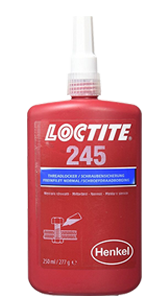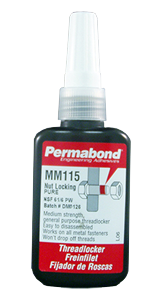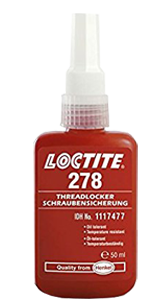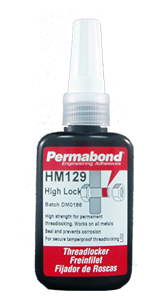A threadlocker is an anaerobic, single-part adhesive which is applied to the threads of fasteners such as screws or bolts to prevent loosening. Threadlocking adhesives are increasingly replacing traditional locking devices in threaded assemblies as a way of overcoming challenging production issues and increasing reliability.
Read on to find out 4 benefits of threadlockers over mechanical locking devices, as well as our top product recommendations…
1. Ability to Gap Fill
Traditional methods are not always effective as they cannot completely fill the gap between the substrate and the fastener. In fact, there is only around 15% contact between the engaging threads of the mechanical locking device, leaving an 85% air gap.
The liquid consistency of threadlockers means they can overcome these design flaws and fully fill the gap with ease, locking out air and other contaminants.
We recommend: Henkel Loctite 245 Medium Strength
2. Reduce Vibration
The air gap which is produced when using mechanical locking devices allows for vibration and a side to side movement of the screw or bolt to occur. This movability leads to the fastener becoming loose and can cause the threaded assembly to fail. When a threadlocker has been used to set the fastener in place, it fills the gap and solidifies to form a tough thermoset plastic. This plastic is resistant to vibration and has strong polymeric chain properties which prevent any lateral movement.
We recommend: Permabond MM15 Threadlocker
3. Resistant to Environmental Factors
Locking threads and bolts can seize together when used in areas with humidity or high temperatures. They are also prone to corrosion and rusting, all of which affect the ability to disassemble the parts for future repair or rework. By implementing threadlockers, they act as a thread lubricant and seal the metals against corrosion.
Furthermore, threadlockers are resistant to extreme temperatures and exhibit high chemical resistance which ensures a strong, robust bond.
We recommend: Henkel Loctite 278 High Strength Threadlocker
4. Less Materials Required
The use of traditional mechanical locking devices requires the user to have a diverse selection of shapes and sizes to ensure there is one suitable for all application requirements. This isn’t an issue with threadlockers however as they are universally applicable to a wide range of substrates regardless of their structure. They also have a lower cost per unit during application when compared to using individual locking devices.
Furthermore, threadlocking adhesives are available in a range of different strengths to suit each application. Low and medium strength threadlockers allow for easy removal for rework using traditional hand tools, whilst high strength variations suit more permanent applications.
We recommend: Permabond HM129 Threadlocker
 Shop our wide range of threadlockers now.
Shop our wide range of threadlockers now.
Additional links:
At Ellsworth Adhesives, we supply a wide range of threadlockers from leading brands Henkel Loctite and Permabond. View our entire range of threadlockers here.
Unsure which threadlocker is right for you? Our Glue Doctor is available to answer any technical questions you may have. Simply fill out our enquiry form.




